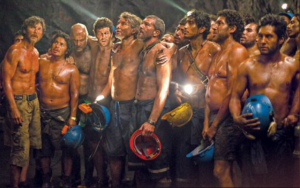Movies ripped from news headlines: A few that got it right, and a few that didn’t
 By Richard Crouse – Metro In Focus
By Richard Crouse – Metro In Focus
The movies have looked to the news for inspiration almost since the first time film was projected on screens.
As far back as 1899, a film called Major Wilson’s Last Stand dramatized scenes from the First and Second Matabele Wars, including the death of Major Allan Wilson and his men in Rhodesia in 1893.
The trend of reel life emulating real life continues this weekend with The 33, an Antonio Banderas film based on a famous mining accident. In 2010, 33 men spent 69 days trapped underground in a copper-gold mine located near Copiapó, Chile when a rock the size of the Empire State Building blocked their exit.
“I can’t think of a better story than this one to bring to the screen,” says producer Mike Medavoy.
The trick is getting the story right. Director Patricia Riggins worked with the miners, Medavoy and screenwriters to create a story that, according to everyone involved, features more fact than fiction.
That isn’t always the case.
According to IMDb the Jim Sturgess movie 21 calls itself a “fact based” story about a group of MIT students who used a complicated card-counting system to fleece Las Vegas casinos for millions of dollars.
The bare bones of the story are true — blackjack was played and MIT students counted cards — but Hollywood diverged from reality when casting the leads. In truth the main players were mainly Asian-Americans, including ringleader Jeff Ma who consulted on the movie.
Ma called the controversy surrounding the casting of Sturgess and Kevin Spacey “over-blown,” adding “I would have been a lot more insulted if they had chosen someone who was Japanese or Korean, just to have an Asian playing me.”
The Michael Bay film Pain & Gain is listed as an action-comedy and stars Mark Wahlberg, Dwayne Johnson and Anthony Mackie certainly play up the jokes. Everyone laughed, except for Marc Schiller, the real-life inspiration for the film’s kidnap victim.
“It wasn’t that funny when they tried to kill me,” he said. “They did run me over with a car twice after trying to blow me up in the car. The way they tell it made it look like a comedy. You also gotta remember that not only I went through this, but certain people were killed, so making these guys look like nice guys is atrocious.”
Last year’s Oscar winner Whiplash saw Miles Teller as a young drummer driven to extremes by a fanatical music teacher played by J.K. Simmons.
The movie draws parallels to the famous story of Jo Jones and Charlie Parker. The legend goes that Jones threw a cymbal at Parker’s head after a lackluster solo, prompting the sax player to go away, practice for a year and return as one of the greatest musicians of the 20th century. Trouble is, the story isn’t true. A cymbal was let loose, but according to eyewitnesses it was dropped on the floor at Parker’s feet and not at his head.
“Not attempted murder,” wrote Richard Brody in the New York Times, “but rather musical snark.”
How does Hollywood get away playing fast and loose with the facts? Black Mass director Scott Cooper says, “I don’t think people come to narrative features for the facts, or for truth. I think you go to documentaries for that. What you do come to narrative features for is psychological truth, emotion and deep humanity.”
